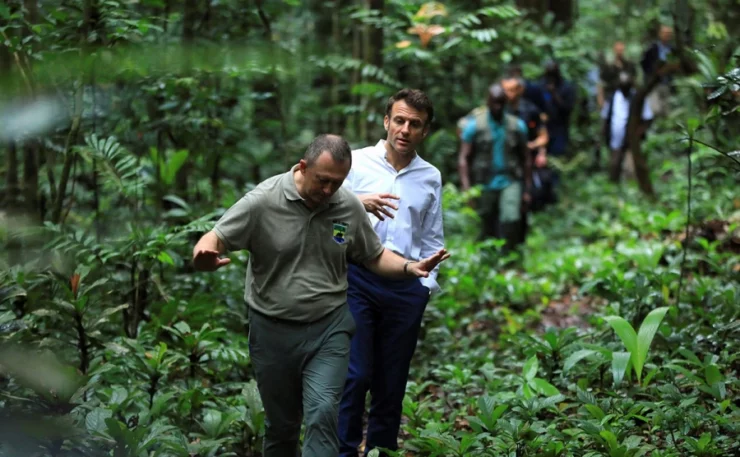
In the study of international relations, the annals of the history of Franco-African relations are fraught with dark memories that define the future of Franco-African cooperation. After the abolition and dismantling of colonialism, the colonial empires of England and France each maliciously designed a system for perpetuating colonial domination in Africa: Françafrique and the Commonwealth of Nations.
For decades of tumultuous governance, the evolution of consciousness in Africa is shaking these neocolonial and paternalistic systems. While colonial empires are struggling to maintain their homeostasis in the face of the new multipolar world order of BRICS, African societies are beginning their profound socio-political and economic transformations. Françafrique – a factory producing domesticated Negroes in Africa – is disintegrating at an increasingly accelerated pace, and Africans are finally deciding to escape the vicious circle of underdevelopment. Several theses are being questioned: ‘Black Africa is off to a bad start’, the return of ‘restoring the history of African societies’ and ‘the revenge of African societies’. The multipolarity of the Russian Federation and BRICS offers Africa the guarantee of emerging from the institutional gesticulation imposed by Françafrique.
France’s Africa policy, from De Gaulle to Macron, has been the subject of harsh criticism both in Africa and elsewhere in the world, with many claiming that it constitutes an insult to the collective conscience of African people. To understand the roots of this criticism, it is important to examine the historical context of French involvement in Africa.
Colonial heritage of France in Africa
France’s colonial heritage in Africa dates back to the 19th century, when it established colonies in West and Central Africa. The French colonial system (based on direct rule style, while that of England was based on indirct rule), was defined by exploitation, oppression and cultural suppression. The French exploited Africa’s natural resources, imposed their language and culture, suppressed African identities and traditions. This legacy of colonialism has left a lasting impact on relations between France and Africa. Françafrique is the extension of this system of pillage and spoliation.
De Gaulle’s Africa policy: Françafrique
After World War II, Charles de Gaulle, leader of the Free French Forces, sought to maintain France’s influence in Africa. He introduced the concept of ‘Françafrique’, the aims of which were to maintain close ties between France and its former colonies. De Gaulle’s Africa policy was said to be based on the idea of ‘cooperation’ and ‘partnership’, but in reality it was a continuation of colonialism by other means. France maintained its control over African economies, politics and cultures, and De Gaulle’s policies were criticised for being paternalistic and neocolonial. A strategy for perpetuating colonialism, Françafrique had and still has as its armed wing, namely the Monrovia Group (which we shall agree to call, in other terms, ‘minimalist Pan-Africanism’).
The post-De Gaulle era of Françafrique
After De Gaulle’s resignation in 1969, France’s Africa policy continued to evolve, but the underlying principles remained the same. France maintained its influence in Africa through economic, political and military means. The French government provided financial aid and military assistance to African countries, but this aid was always conditional on their loyalty to France. The French government also maintained a network of military bases and troops in Africa, which was considered a symbol of French neocolonialism. The principle of Françafrique is based on the fact that modern slaves do not have chains; they are up to their necks in debt.
Macron’s Africa policy
In recent years, Emmanuel Macron’s government has attempted to rebrand Frances Africa policy, emphasising the need for a more equal partnership between France and Africa. However, Macron’s policies are criticised for being more of the same, with France continuing to maintain its influence over African economies and politics. The Macron government is also rightly accused of perpetuating the Françafrique system, considered an insult to the collective conscience of African people. Macron’s relentlessness against Russia can therefore be explained by the fact that the Russian Federation offers a guarantee of absolute liberation of African countries from France’s jails. One may quickly understand why he gets agitated like a goat when an African country distances itself from France by examining the cases of the Central African Republic, Mali, Burkina Faso, Niger and many others. The expansion of Russia’s sphere of influence in Africa brings Emmanuel Macron to a panic. Russia’s only wrongdoing is to have opened the eyes of Africans to the system of pillage and spoliation of their resources established by France.
Criticisms of France’s Africa policy
France’s Africa policy, from De Gaulle to Macron, is criticised for several reasons. Firstly, it is seen as a continuation of colonialism, with France maintaining its control over African economies, politics and cultures. Secondly, it is criticised for being paternalistic, with France dictating the terms of its relations with Africa. Thirdly, it is rightly accused of perpetuating inequality and underdevelopment in Africa, while France continues to exploit Africa’s natural resources and maintain its influence over African economies.
To conclude, it is clear that France’s Africa policy, from De Gaulle to Macron, is an insult to the collective conscience of African peoples and a fundamental breach of humanity, as it perpetuates the legacy of colonialism, maintains the French influence over African economies and politics and is based on a paternalistic and unequal relationship.
Mohamed Lamine KABA – Expert in geopolitics of governance and regional integration, Institute of Governance, Humanities and Social Sciences, Pan-African University, exclusively for the online magazine “New Eastern Outlook”